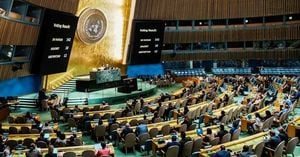Donald Trump’s recent election victory has sent shockwaves through the renewable energy sector, particularly affecting offshore wind investments across the United States. German energy giant RWE AG has been among the first to respond publicly to the changing political climate, with reports indicating the company plans to cut its investment budget significantly amid growing uncertainties surrounding its U.S. offshore projects.
Following Trump's win, RWE announced it would reduce its spending plans by €3 billion, revising its total investment budget down to €7 billion for the next fiscal year. This decision marks a sharp decline from the previously projected €10 billion outlay, drawing concerns about the viability of its ambitious financing plans totaling €55 billion focused on renewable developments through 2030. RWE's CFO, Michael Müller, emphasized the increased risks tied to its offshore wind initiatives along the U.S. East Coast, especially following election outcomes which were unfriendly to the green energy agenda.
RWE's project portfolio includes significant developments like the Community Offshore Wind project, which is set to add six gigawatts (GW) of capacity off the coasts of New York and New Jersey, along with another 1.6 GW project known as Canopy Offshore Wind off Northern California. The company’s precarious situation reflects broader anxieties prevalent within the energy sector, echoed by industry analysts and rival corporations.
While RWE appears to be scaling back on its U.S. initiatives, other energy executives are cautiously optimistic. For example, Siemens Energy’s CEO Christian Bruch noted, "We have got more to win than lose in U.S. onshore wind projects." This comment suggests at least some players believe there's still potential for growth, albeit within increasingly unpredictable parameters as Trump's administration is expected to face challenges implementing his energy policies.
Indeed, much of the concern stems from Trump’s articulated intent to dismantle the provisions of the Inflation Reduction Act, which supports renewable initiatives with nearly $433 billion earmarked for grants, loans, and tax incentives. Investors reacted swiftly to the election result by selling off shares of various renewable-energy-focused companies, including RWE, underscoring the sentiment of instability.
Simultaneously, some players, such as Alistair Phillips-Davies from SSE Group, have observed prospectively favorable conditions for the U.K.’s renewable sector. Phillips-Davies suggested, “While it’s not good news for U.S. renewables, it could help the U.K. secure more supply chain opportunities without the U.S. competing aggressively.” He pointed out the potential for the UK to fast-track its own production and supply of wind energy components, thereby enhancing its economic competitive edge.
This sentiment finds support across various industry sectors, as businesses grapple with maintaining momentum for renewable projects during uncertain political climates. Despite recent stock market fluctuations—a 4% drop in RWE shares post-election—RWE’s announcement of initiating a €1.5 billion share buy-back program has helped stabilize the company’s position.
RWE has reported €4 billion earnings within the first nine months of the year, albeit down from €5.7 billion during the same period last year, reflecting challenges even amid rising renewable production. This indicates the tumultuous balance companies must manage as they pivot their strategies and allocate investments under shifting political leadership.
Adding layers of complexity, the forecast for green hydrogen production—another avenue of focus for RWE—also appears dimmer, compounding challenges tied to offshore wind projects. Müller noted the company's hydrogen strategy is projected to lag due to altered political landscapes, likely delaying its investments. This slow progress could inhibit the broader European clean energy transition as well.
The offshore wind energy sector remains at the crossroads of opportunity and risk as Trump's administration takes shape. Industry leaders will need to navigate regulatory changes, assess local laws impacting project feasibility, and remain agile to adapt strategies quickly as economic and political conditions evolve.
Investors and analysts continue to monitor developments closely, reflecting the broader energy market’s delicate balance between hope for clean energy advancements and the reality of unpredictable political landscapes. The geopolitical effects of U.S. policy will be under scrutiny as Europe grapples with its own complex energy and supply chain dynamics.
With stakeholders across the globe watching intently, the fate of offshore wind investments—and potentially the future of renewable energy—hangs on the outcomes and shifts influenced by U.S. political decisions and their international repercussions.



